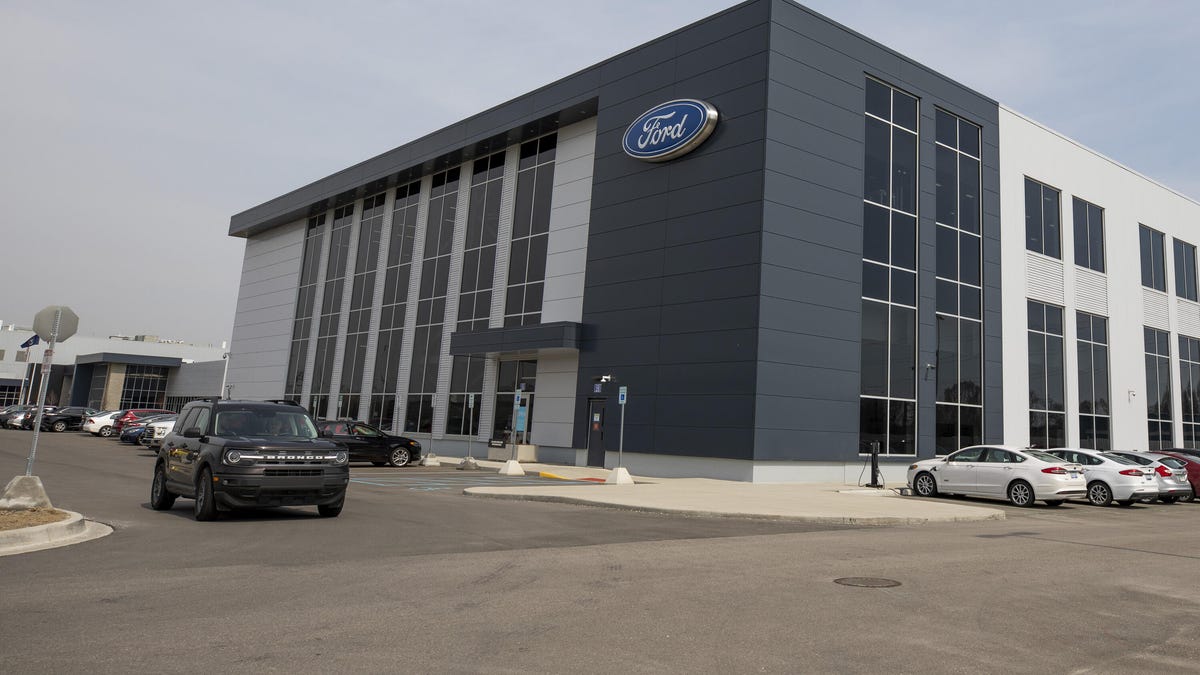Ford Ion Park battery-development center announced
Located in Southeastern Michigan, this upcoming facility will help the automaker develop, test and manufacturer new battery designs.
Ford is getting serious about EVs. Seriously. The Mustang Mach-E battery-powered SUV is available today, the E-Transit emissions-free commercial van is under development and an all-electric F-150 is set to launch in the middle of next year. Continuing the blue-oval's EV push, on Tuesday the automaker announced it will open Ford Ion Park, a new global battery development center in Southeastern Michigan.
With some 200,000 square-feet of space, this facility is the result of a $185 million investment and will be home to a cross-functional team of around 150 people, experts in diverse fields like battery development, manufacturing, quality assurance and more. The Ford Ion Park crew will tackle a variety of challenges -- everything from battery integration and recycling to the EV supply chain management. This facility will be headed up by Anand Sankaran, a Ford veteran who's worked in the electrified-vehicle field for decades. With 32 patents to his name, he's currently the company's director of electrified systems engineering. To date, he's had a hand in developing a range of EV models, including the original Escape Hybrid, which launched back in 2004.
Ford Ion Park is intended to help the automaker evaluate novel battery-manufacturing techniques, create new cell designs and research innovative materials as it works to vertically integrate its battery design and manufacturing capabilities. "This facility will be a learning lab," said Sankaran during a conference call with media, adding that it will support both the lab-scale and pilot-scale assembly of battery cells, which should help Ford learn more about how to mass-produce electric-vehicle batteries.
The future is electric... it just isn't here quite yet.
The automaker will still rely on outside suppliers, but the recent chip shortage has highlighted the need for Ford to have more control over its supply chain. Speaking during the same call as Sankaran, Hau Thai-Tang, Ford's chief product platform and operations officer said there should be sufficient scale for the company to "entertain further levels of vertical integration," a more Tesla-like approach to building EVs.
Thai-Tang noted how challenging it is for established companies to navigate new technology, but he asserted, "We will lead this transition from ICE (internal-combustion engines) to BEV (battery-electric vehicles)." Ford is no longer hedging its bets; the company is confident the fossil-fuel-to-electric transition is underway and that it will happen faster than many people imagine. "I think we've accelerated our ambition," he added, in order to be a leader in manufacturing electric vehicles.
Ford's existing Battery Benchmarking and Test Laboratory in Allen Park, Michigan, will also help support the automaker's efforts by evaluating various battery chemistries. This facility opened last year and boasts of 150 test chambers and 325 channels for development work. To date, it's analyzed more than 150 types of battery cells.
Loads of research and testing will take place at Ford Ion Park.
The creation of Ford Ion Park, which is set to open toward the end of next year, is the latest in a long string of important EV milestones for the company. Ford is investing $22 billion in battery-powered vehicles and it's committed to offering an all-electric vehicle lineup in Europe by 2030. Beyond all that, to date, Ford has more than 2,500 patents related to vehicle electrification while another 4,300 are pending.
The Mustang Mach-E, E-Transit and all-electric F-150 are just the first three battery-powered vehicles Ford has announced as part of its 21st-century EV offensive, and it's already finding success. Thai-Tang said the Mach-E is proving to be extremely popular, with examples selling after sitting at dealerships for fewer than seven days. With Ford Ion Park and the research and development that will take place there, the blue-oval brand seems poised to have even greater electric-vehicle success in the future.


